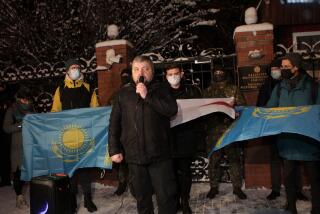A Man for a People in Misery : Poland: Premier Mazowiecki strikes a melancholy and charmless figure. But his lack of showmanship underlines his moral force.
WASHINGTON â A highly unusual politician visited Washington last week, without much fanfare. He is not prone to showy behavior, not even to attract attention to the causes about which he cares so much. Polandâs Premier Tadeusz Mazowiecki has none of the flair and spontaneity of his countryman and friend, Lech Walesa. And yet he is a contemporary political figure at the level of Czechoslovakiaâs Vaclav Havel, one who professes that âthere is no great politics without a moral foundation.â
This melancholy, tired, and apparently charmless 63-year-old seems the antithesis of a politician, especially one charged with hauling his country out of 45 years of moral and intellectual torpor. He comes across as a loner and a thinker, certainly not the leader of a nation. He has written: âI am attached to ideals and personalities who had no successes in politics but rather served as mile markers for othersâ thinking and behavior.â His deep humanism could be seen, for instance, in internment, with thousands of other Solidarity activists in 1981-82, when he protested against the Communist governmentâs separation of arrested intellectuals and workers in an attempt to destroy the universal character of Solidarity and to break the more vulnerable workers. And yet all his life this uncompromising moralist has been involved in politics.
In the words of a colleague, âMazowiecki is one of the most independent people in Poland, a tenacious and consistent man who stands up to evil in both the political and social senses.â
He has been in the middle of the action at all of the key junctures in Polandâs postwar struggles for freedom--serving as an independent Roman Catholic deputy to the Sejm in 1962-71, editing liberal Catholic publications, defending protesting students and denouncing the governmentâs anti-Semitic campaign in 1968, working as Lech Walesaâs adviser through the thick and thin of Solidarityâs existence since 1980. He has also gained respect as a fair and yet unbending negotiator between Polandâs democratic opposition and the Communists.
The best campaign strategist could not have planned his inauguration better: Mazowiecki nearly fainted, interrupting his characteristically lengthy and sober speech, as millions waited breathless in front of their television sets. In the United States, this would likely have sown doubt in peopleâs minds. In Poland, it won Mazowiecki a place in peopleâs hearts. Now, he enjoys phenomenal popularity among the people, as they brace themselves for still more misery before the new economic plan begins to bear fruit. Mazowiecki seems to symbolize this sadly smiling, tired country that is beginning to lift itself out of decades of abuse.
The choice of Mazowiecki as Polandâs first non-Communist prime minister in some subconscious way fulfills the need of the Polish people for a leader of total integrity after decades of government which can best be described as one of lies. In an era of exhaustion and uncertainty and cynicism, he does not play games or make promises or try to present himself as anything he is not. He only tells his people that he knows how much they have suffered and that he will ask them to suffer more.
He came to the United States as an earnest, no-nonsense negotiator. The German question, a key preoccupation in recent months, is high on his agenda: âWe must watch this problem closely, but we mustnât become slaves to our fears,â he has written. So are economic cooperation and foreign investments.
Time will tell whether Mazowieckiâs style of government is too gentle, especially in a country that has had its patience stretched to the limit, not only by economic catastrophe but also by the perceived slowness of political change when Polandâs neighbors are moving so fast. But the prime minister refuses to vie for cheap popularity by, for example, purging Communists: âI believe that in building a future on the rubble of Communist totalitarianism, style is extremely important . . . whether it will be an eruption of hatred or an opening of opportunities to all, in a free, pluralistic society. I believe that we will score a great victory only if we can walk the latter path. I believe that we are on it already. Only on it can I see my place as a politician and a Christian.â
Will Mazowiecki succeed? His record shows that he is not a dreamer. He has chosen a most pragmatic economic plan. The uphill protest actions in which he was involved accumulated over time the massive popular pressure that made possible the new Polish democracy. True, his actions are a gamble with popular support. But this is the only way this unlikely politician can be: true to himself.
More to Read
Sign up for Essential California
The most important California stories and recommendations in your inbox every morning.
You may occasionally receive promotional content from the Los Angeles Times.










